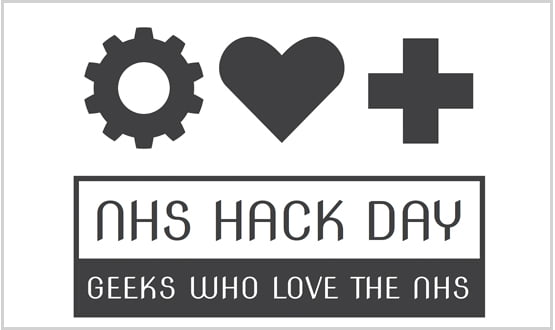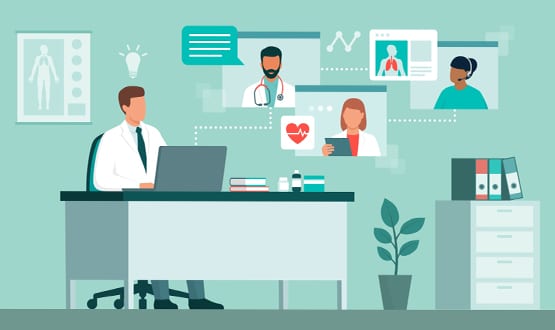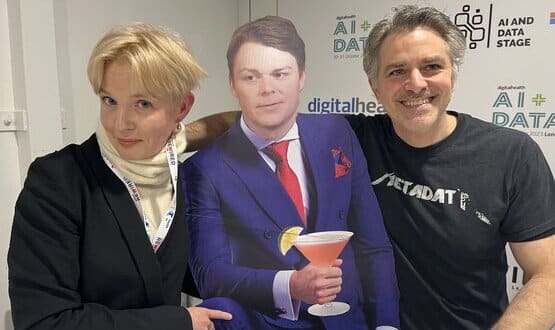Tom’s digital disruptors: NHS Hack Day
- 7 September 2015

In the world of NHS IT, which tends to be dominated by large companies working with what is still a very centralised system, being one person with a good idea can be challenging.
The rise of mobile apps and personal technology is starting to allow some smaller organisations with specific expertise to make an impact. But individuals can struggle to get their voices heard beyond their most immediate colleagues.
That is where NHS Hack Day comes in, according to its advocates. Its events bring together around 150 people from a variety of backgrounds with an interest in healthcare IT, to spend a weekend brainstorming solutions for everyday problems faced by the NHS.
Dr Marcus Baw, a freelance GP with an interest in IT, is organising the next event in Manchester on the weekend of 12 September.
He says he wants it to give people “the courage to say ‘I have a good idea and I think it can benefit patients and I’m going to make it into a business.’”
“There was a time in the 1980s and 1990s that sort of health IT entrepreneurial spirit was very much alive and you can see that in that era all the GP systems that exist now were created,” says Baw.
Then came several failed national projects to get a unified IT system across the NHS in England, which “sliced a hole out of the middle of a generation really.”
“It meant that people who weren’t involved in national projects could not be involved in NHS IT. So NHS Hack Day is in many ways a response to that. It’s a pathway that allows you to gate-crash NHS IT. It provides that community you need to work out how you are going to take an idea forward.”
How a Hack Day works
It was that ethos that inspired Dr Carl Reynolds, an academic clinical fellow in respiratory medicine, to put on the first NHS Hack Day in London back in 2012.
He took the basic premise of hack days (intense weekend events that bring together a group of developers to rapidly build and prototype new software and hardware) and applied it to the NHS.
Since then there have been nine further events in cities across England and Wales, bringing together a broad spectrum of clinicians, developers, patients and other people working in healthcare to work together on innovative solutions to frustrating problems.
Each event has followed a similar format, says Dr David Miller, who was at the first weekend and is now president at Open Health Care UK, a company founded by Reynolds that helps to coordinate and organise the NHS Hack Days.
The basic premise is that around 150-200 delegates turn up at the venue on Saturday morning, of whom around 30 to 40 will have a healthcare problem that the use of IT could solve. They pitch to the rest of the audience in two minutes.
“We try and encourage people to focus on small, concrete needs that can be solved, so that over the course of a weekend you can get to something that can make a difference on the Monday after the event,” says Miller.
Following this procession of pitches, there is a period in which the delegates can chat to any of the pitchers, to work out whether they have an idea or skills that may contribute to a potential solution.
“It’s a very organic process,” says Baw, who adds that after 30 minutes to an hour there will be teams that are ready to work on 10 to 15 of the pitched ideas.
Members of these teams come from a range of backgrounds, including doctors, developers, nurses, patients, NHS management and user experience agencies.
Once the teams are sorted, they spend the rest of the day working on their individual projects, before heading to the pub in the evening (although a few more eager participants will then go back to coding straight afterwards).
Sunday morning is another chance to carry on working to create what Miller describes as the “minimum viable product that can solve a problem.” Then, everyone gets together in the afternoon to hear presentations on what they teams have come up with.
Kudos and community
When the presentations are over it’s up to the set of expert judges to decide on what projects are the best and to dish out the prizes, although the only tangible items that winners can take home on the day are t-shirts, says Baw.
“It’d be nice to say ‘here’s £50,000 for the winner to develop their project’, but we’re a long way from that sort of prize.”
What NHS Hack Day can offer are the opportunities and attention that come from having a project recognised as a useful tool. “There’s a certain amount of kudos [in winning a Hack Day],” says Baw.
“If there are people in audience who work for healthcare IT companies sometimes that results in that project being picked up by somebody else. There’s a huge amount of exposure.”
Winners can also discuss ideas with the rest of the community and get advice on how to take things forward on their own.
“We’ve got people who have done that in the community. They can advise how to take ideas forward as a small enterprise. And that is exactly what the NHS needs the most. What we don’t need is for big companies to go around buying up the best ideas.”
Hack Day success
There certainly have been several projects conceived at Hack Day events that have gone on to achieve real success in working healthcare systems.
Miller mentions a project to create an open, online version of the British National Formulary, a pharmaceutical reference resource that usually comes as a very thick book that isn’t always available when required by a doctor.
A Hack Day team attempted to address this by taking the information in the BNF and creating an online version that was mobile friendly and could be viewed on a smartphone at a patient’s bedside. Miller says the tool had a few hundred users a month over the next couple of years.
Building on this, the team spoke to the National Institute for Health and Care Excellence, which now hosts a mobile friendly version of the BNF. “We were able to have a little nudge,” says Miller.
Another successful project mentioned by Miller is Cell Counter, a simple one page web application which supports haematologists to make calculations related to blood cells. The team behind it has now formed a community interest company and is developing the product further.
An inspiring ethos
As an attendee of past Hack Days, Baw has been involved directly with several projects, including the winner of the most recent event in London.
The project, called Take Your Meds, is a reminder service that means people get a phone call when it is time to take their medication; recognising that reminder apps for smartphones miss the huge number of people that aren’t using the latest technologies.
“We aimed to think of something that was the lowest possible technology point that could work. So we went with a landline or mobile telephone, because everybody pretty much has a phone. Even some elderly person with poor eyesight living alone can have a telephone.”
Users can configure the system to ring as many times a day as necessary. They can even get friends or family members to record messages, so it is someone they know who is telling them to take a medicine, rather than a generic voice.
Baw says the team has managed to get a small amount of funding and the aim is to run the business as a non-profit enterprise that can sell the product at a price people can afford.
“If we could do it entirely for free we would, but as things stand the telephony to phone people costs us money so we have to past that on.”
It’s that ethos of sharing a good idea, rather than using it to make a profit that is at the heart of what the organisers of NHS Hack Day want to achieve. “This is not an R&D exercise, it’s not an accelerator,” says Miller. “It’s not that kind of thing.”
Instead the organisers – who do not have a stake in any products developed – encourage, but don’t enforce, a culture of open sourcing.
And Baw says this is a philosophy shared by many healthcare professionals working in the NHS – an organisation he refers to as “the last vestige of socialism in the country.”
“A lot of doctors do tend to have that internal ideology of ‘I’ve got an idea and it can help people I’d rather share it than keep it to myself.’”
No doubt that this will be the ethos of many attending the next event, and it will be exciting to see what ideas spring up on the weekend of 12 September in Manchester.
Digital Health News is sponsoring the drinks at the upcoming NHS Hack Day in Manchester. This reflects Digital Health News' increased coverage of apps and other disruptive technologies and their importance to the NHS.
 |
Tom MeekThomas Meek is a reporter at Digital Health News. February 2015 after spending several years writing about the pharmaceutical industry and healthcare communications, where he developed his interest in using new technologies to support patient care and education. He has a degree in journalism from The University of Stirling. Find him on Twitter at @DHTomMeek |
 |




